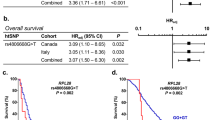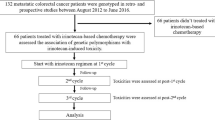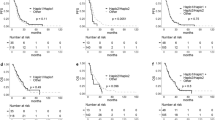Abstract
Polymorphic variants in IL-17A gene were differentially associated with colorectal cancer (CRC) susceptibility but their link with response and toxicity to CRC treatment have not yet been evaluated. We investigated association between seven IL-17A variants with the response and toxicity to CRC treatment in 294 patients with CRC. IL-17A genotyping was done by real-time PCR. MAF of rs3748067 was significantly higher in CRC cases resistant to FOLFOX treatment (R+) than non resistant (R−). Significantly higher rs3804513 MAF was noted in R+ versus R− colon cancer (CC). Higher rs2275913 and rs10484879, and reduced rs3804513 MAF were seen in rectal cancer (RC) tolerant to FOLFOX (T+) compared to (T−) patients. Strong association of rs3819025, rs3804513, and rs7747909 was found with tolerance to RC treatment. rs3748067 was associated with FOLFOX tolerance in CC but not RC. Significant higher frequency of AGGCAGG and GAGCAGG haplotypes was seen among R + CC, thus assigning non-favorable nature to these haplotypes. Higher and lower frequencies of GAGTAAG and AGGCTGA haplotypes, respectively, were observed in T + RC, thereby assigning FOLFOX-tolerant and non-tolerant nature to these haplotypes. The obtained results suggest that IL-17A variants and haplotypes may be a target for future management of CRC treatment.
This is a preview of subscription content, access via your institution
Access options
Subscribe to this journal
Receive 12 print issues and online access
$259.00 per year
only $21.58 per issue
Buy this article
- Purchase on Springer Link
- Instant access to full article PDF
Prices may be subject to local taxes which are calculated during checkout
Similar content being viewed by others
References
Peters U, Bien S, Zubair N. Genetic architecture of colorectal cancer. Gut. 2015;64:1–14.
Giordano L, Bisanti L, Salamina G, Ancelle Park R, Sancho-Garnier H, Espinas J, et al. The EUROMED CANCER network: state-of-art of cancer screening programmes in non-EU Mediterranean countries. Eur J Public Health. 2016;26:83–9.
Khiari H, Ben Ayoub HW, Ben Khadhra H, Hsairi M. Colorectal cancer incidence trend and projections in Tunisia (1994–2024). Asian Pac J Cancer Prev. 2017;18:2733–9.
Wheat CL, Clark-Snustad K, Devine B, Grembowski D, Thornton TA, Ko CW. Worldwide incidence of colorectal cancer, leukemia, and lymphoma in inflammatory bowel disease: an updated systematic review and meta-analysis. Gastroenterol Res Pract. 2016;2016:1632439. https://doi.org/10.1155/2016/1632439/.
Boakye D, Rillmann B, Walter V, Jansen L, Hoffmeister M, Brenner H. Impact of comorbidity and frailty on prognosis in colorectal cancer patients: a systematic review and meta- analysis. Cancer Treat Rev. 2018;64:30–9.
Lee J, Xiao YY, Sun YY, Balderacchi J, Clark B, Desani J, et al. Prevalence and characteristics of hereditary non-polyposis colorectal cancer (HNPCC) syndrome in immigrant Asian colorectal cancer patients. BMC Cancer. 2017;17:843.
Sperling D, Jandorf L, Sriphanlop P, Martinez C, Brown KL, Soper ER, et al. Co-care: a registry for individuals at increased risk for colorectal cancer. J Regist Manag. 2017;44:11–6.
Kim ER, Chang DK. Colorectal cancer in inflammatory bowel disease: the risk, pathogenesis, prevention and diagnosis. World J Gastroenterol. 2014;20:9872–81.
Mager LF, Wasmer MH, Tilman T Rau, Krebs P. Cytokine-induced modulation of colorectal cancer. Front Oncol. 2016;6:96 https://doi.org/10.3389/fonc.2016.00096/.
Lin WW, Karin M. A cytokine-mediated link between innate immunity, inflam- mation, and cancer. J Clin Investig. 2007;117:1175–83.
Murugaiyan G, Saha B. Protumor vs antitumor functions of IL17. J Immunol. 2009;183:4169–75.
Ibrahim S, Girault A, Ohresser M, Lereclus E, Paintaud G, Lecomte T, et al. Monoclonal antibodies targeting the IL-17/IL-17RA axis: an opportunity to improve the efficiency of anti-vegf therapy in fighting metastatic colorectal cancer? Clin Colorectal Cancer. 2018;17:e109–13. https://doi.org/10.1016/j.clcc.2017.10.003/
Wu D, Wu P, Huang Q, Liu Y, Ye J, Huang J. Interleukin-17: a promoter in colorectal cancer progression. Clin Dev Immunol. 2013;2013:436307. https://doi.org/10.1155/2013/436307/.
Cua DJ, Tato CM. Innate IL-17-producing cells: the sentinels of the immune system. Nat Rev Immunol. 2010;10:479–89.
Veldhoen M. Interleukin 17 is a chief orchestrator of immunity. Nat Immunol. 2017;18:612–21.
Kurebayashi Y, Nagai S, Ikejiri A, Koyasu S. Recent advances in understanding the molecular mechanisms of the development and function of Th17 cells. Genes Cells. 2013;18:247–65.
Joerger M, Finn SP, Cuffe S, Byrne AT, Gray SG. The IL-17-Th1/Th17 pathway: an attractive target for lung cancer therapy? Exp Opin Ther Targets. 2016;20:1339–56.
Lee MH, Tung-Chieh Chang J, Liao CT, Chen YS, Kuo ML, et al. Interleukin 17 andperipheral IL-17-expressing T cells are negatively correlated with the overall survival of head and neck cancer patients. Oncotarget. 2018;9:9825–37.
Numasaki M, Fukushi J, Ono M, Narula SK, Zavodny PJ, Kudo T, et al. Interleukin-17 promotes angiogenesis and tumor growth. Blood. 2003;101:2620–7.
Tseng JY, Yang CY, Liang SC, Liu RS, Yang SH, Lin JK. Interleukin-17A modulates circulating tumor cells in tumor draining vein of colorectal cancers and affects metastases. Clin Cancer Res. 2014;20:2885–97. https://doi.org/10.1158/1078-0432.CCR-13-2162/.
Cui G, Yuan A, Goll R, Florholmen J. IL-17A in the tumor microenvironment of the human colorectal adenoma-carcinoma sequence. Scand J Gastroenterol. 2012;47:1304–12.
Kryczek I, Wei S, Zou L, Altuwaijri S, Szeliga W, Kolls J. Cutting edge: Th17 and regulatory T cell dynamics and the regulation by IL-2 in the tumor microenvironment. J Immunol. 2007;178:67303. https://doi.org/10.4049/jimmunol.178.11.6730/.
Limagne E, Euvrard R, Thibaudin M, Rébé C, Derangère V, Chevriaux A, et al. Accumulation of MDSC and Th17 cells in patients with metastatic colorectal cancer predicts the efficacy of a FOLFOX-Bevacizumab drug treatment regimen. Cancer Res. 2016;76:5241–52.
Dai ZM, Zhang TS, Lin S, Zhang WG, Liu J, Cao XM. Role of IL-17A rs2275913 and IL-17F rs763780 polymorphisms in risk of cancer development: an updated meta-analysis. Sci Rep. 2016;4:20439. https://doi.org/10.1038/srep20439/.
Zhou F, Qiu LX, Cheng L, Wang MY, Li J, Sun MH, et al. Associations of genotypes and haplotypes of IL-17 with risk of gastric cancer in an eastern Chinese population. Oncotarget. 2016;7:82384–95.
Omrane I, Baroudi O, Bougatef K, Mezlini A, Abidi A, Medimegh I, et al. Significant association between IL23R and IL17F polymorphisms and clinical features of colorectal cancer. Immunol Lett. 2014;158:189–94.
Zhu L, Wang Y, Jie G, Chi Q, Zhou J, Cui B, et al. Association between Toll-like receptor 4 and interleukin 17 gene polymorphisms and colorectal cancer susceptibility in Northeast China. Med Oncol. 2014;31:73. https://doi.org/10.1007/s12032-014-0073-x/.
Bedoui SA, Barbirou M, Stayoussef M, Dallel M, Mokrani A, Makni L, et al. Association of interleukin-17A polymorphisms with the risk of colorectal cancer: a case-control study. Cytokine. 2018;110:18–23.
Douillard JY, Hoff PM, Skillings JR, Eisenberg P, Davidson N, Harper P, et al. Multicenter phase III study of uracil/tegafur and oral leucovorin versus fluorouracil and leucovorin in patients with previously untreated metastatic colorectal cancer. J Clin Oncol. 2002;20:3605–16.
Cassidy J, Twelves C, Van Cutsem E, Hoff P, Bajetta E, Boyer M, et al. First-line oral capecitabine therapy in metastatic colorectal cancer: a favorable safety profile compared with intravenous 5-fluorouracil/leucovorin. Ann Oncol. 2002;13:566–75.
Hurwitz H, Fehrenbacher L, Novotny W, Cartwright T, Hainsworth J, Heim W. et al. Bevacizumab plus irinotecan, fluorouracil, and leucovorin for metastatic colorectal cancer. N Engl J Med. 2004;350:2335–42.
Regnier DV, Poirson J, Nourissat A, Jacquin JP, Guastalla JP, Chauvin F. Adherence with oral chemotherapy: results from a qualitative study of the behaviour and representations of patients and oncologists. Eur J Cancer Care. 2011;20:520–7.
Twelves C, Wong A, Nowacki MP, Abt M, Burris H 3rd, Carrato A, et al. Capecitabine as adjuvant treatment for stage III colon cancer. N Engl J Med. 2005;352:2696–704.
Renehan AG, Flood A, Adams KF, Olden M, Hollenbeck AR, Cross AJ. Body mass index at different adult ages, weight change, and colorectal cancer risk in the National Institutes of Health-AARP Cohort. Am J Epidemiol. 2012;176:1130–40.
Kopetz S, Hoff PM, Morris JS, Wolff RA, Eng C, Glover KY, et al. Phase II trial of infusional fluorouracil, irinotecan, and bevacizumab for metastatic colorectal cancer: efficacy and circulating angiogenic biomarkers associated with therapeutic resistance. J Clin Oncol. 2010;28:453–9.
Reppert S, Boross I, Koslowski M, Türeci Ö, Koch S, Lehr HA, et al. A role for T-bet-mediated tumour immune surveillance in anti-IL-17A treatment of lung cancer. Nat Commun. 2011;20:600. https://doi.org/10.1038/ncomms1609.
Cochaud S, Giustiniani J, Thomas C, Laprevotte E, Garbar C, Savoye AM, et al. IL-17A is produced by breast cancer TILs and promotes chemoresistance and proliferation through ERK1/2. Sci Rep. 2013;9:1–10.
Omrane I, Medimegh I, Baroudi O, Ayari H, Bedhiafi W, Stambouli N. Involvement of IL17A, IL17F and IL23R polymorphisms in colorectal cancer therapy. PLoS ONE. 2015;10:e0128911. https://doi.org/10.1371/journal.pone.0128911/.
Slattery ML, Wolff RK, Herrick JS, Caan BJ, Potter JD. IL6 genotypes and colon and rectal cancer. Cancer Causes Control. 2007;18:1095–105.
Chung YC, Chaen YL, Hsu CP. Clinical significance of tissue expression of interleukin-6 in colorectal carcinoma. Anticancer Res. 2006;26(5B):3905–11.
Sui G, Qiu Y, Yu H, Kong Q, Zhen B. Interleukin-17 promotes the development of cisplatin resistance in colorectal cancer. Oncol Lett. 2019;17:944–50.
Birkenkamp-Demtroder K, Olesen SH, Sørensen FB, Laurberg S, Laiho P, Aaltonen LA, et al. Differential gene expression in colon cancer of the caecum versus the sigmoid and rectosigmoid. Gut. 2005;54:374–84.
Gock M, Mullins CS, Bergner C, Prall F, Ramer R, Göder A. et al. Establishment, functional and genetic characterization of three novel patient-derived rectal cancer cell lines. World J Gastroenterol. 2018;24:4880–92.
Imperial R, Ahmed Z, Toor OM, Erdoğan C, Khaliq A, Case P, et al. Comparative proteogenomic analysis of right-sided colon cancer, left-sided colon cancer and rectal cancer reveals distinct mutational profiles. Mol Cancer. 2018;17:177. https://doi.org/10.1186/s12943-018-0923-9/.
Hong TS, Clark JW, Haigis KM. Cancers of the colon and rectum: identical or fraternal twins? Cancer Discov. 2012;2:117–21.
Venook AP, Niedzwiecki D, Lenz H-J. CALGB/SWOG 80405: phase III trial of irinotecan/5-FU/leucovorin (FOLFIRI) or oxaliplatin/5-FU/leucovorin (mFOLFOX6) with bevacizumab (BV)or cetuximab (CET) forpatients (pts) with KRAS wild-type (wt) untreated metastaticadenocarcinoma of the colon or rectum (MCRC). J Clin Oncol. 2014;32(LBA3):2014. https://doi.org/10.1200/jco.2014.32.18_suppl.lba3.2.
Maniati E, Soper R, Hagemann T. Up for Mischief? IL-17/Th17 in the tumour micro-environment. Oncogene. 2010;21(29):5653–62.
Zou W, Restifo NP. T(H)17cells in tumour immunity and immunotherapy. Nat Rev Immunol. 2010;10:248–56.
Prahallad A, Sun C, Huang S, Di Nicolantonio F, Salazar R, Zecchin D. et al. Unresponsiveness of colon cancer to BRAF(V600E) inhibition through feedback activation of EGFR. Nature. 2012;483:100–3.
Acknowledgements
We thank all blood donors and the patients with CRC who participated in the present study. This study was funded in part by the Ministry of High Education and Scientific Research and the National Agency of Promotion of Research, Project 2017 D4P1.
Author information
Authors and Affiliations
Corresponding author
Ethics declarations
Conflict of interest
The authors declare that they have no conflict of interest.
Additional information
Publisher’s note: Springer Nature remains neutral with regard to jurisdictional claims in published maps and institutional affiliations.
Rights and permissions
About this article
Cite this article
Bedoui, S., Dallel, M., Barbirou, M. et al. Interleukin-17A polymorphisms predict the response and development of tolerance to FOLFOX chemotherapy in colorectal cancer treatment. Cancer Gene Ther 27, 311–318 (2020). https://doi.org/10.1038/s41417-019-0102-1
Received:
Revised:
Accepted:
Published:
Issue Date:
DOI: https://doi.org/10.1038/s41417-019-0102-1



